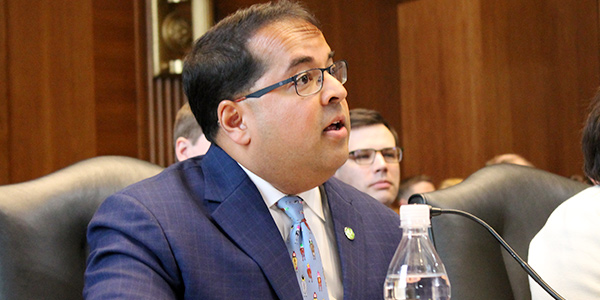FERC ordered NERC Tuesday to audit the compliance monitoring and enforcement programs (CMEP) of all regional entities by June 30, 2023, rejecting an alternative audit plan proposed by the organization last year as “insufficient” (RR19-7).
The commission’s order, issued at its monthly open meeting, follows a June compliance filing from NERC that was mandated by FERC in response to the organization’s five-year performance review. (See NERC Wins Another 5 Years as ERO.)
In that mandate, FERC expressed concern that NERC had failed to conduct the “comprehensive” CMEP audits that Appendix 4A of its Rules of Procedure (ROP) require it to perform on the REs at least once every five years, noting that the performance assessments for both 2014 and 2019 did not mention any such audits. The commission required that NERC produce any RE audits it had performed or outline a plan to perform them within the next 18 months.
In the June filing, NERC disclosed that it had “conducted two [CMEP] audits of the regional entities” since 2014, though these were “limited to … confidential information and conflict of interest procedures [and] internal controls evaluations of registered entities.” (See NERC Clarifies Audits, E-ISAC in Filing.) The organization also conducted two “non-CMEP” audits during the same period that examined REs’ implementation of the event analysis process and of Section 215 of the Federal Power Act.
FERC Rejects Alternate Audit Proposal
Rather than a plan for performing comprehensive audits in compliance with Appendix 4A, NERC’s June filing proposed ROP changes describing a new audit procedure. The proposal would see NERC expand its internal audit department — which currently focuses on NERC’s CMEP, Organization Registration and Certification Program, and bulk electric system exception activities — to include the REs’ versions of these programs.
Such audits would be conducted at least once every three years and would allow participation by representatives from FERC, which NERC suggested would be “more effective and efficient” than a five-year audit schedule. However, the commission rejected the plan, saying that “although [it] provides for a defined audit frequency, submittal of audit reports to the commission, and commission staff participation … it does not sufficiently assess the regional entities’ compliance and performance.”
FERC criticized NERC’s proposal for lacking requirements as to scope or procedural rules, with the internal audit department to set these for each audit. The plan also fails to explain how auditors will prioritize sections of the ROP for audit or to provide examples of previous audits that the commission can use to evaluate the proposal.
“In addition to the potential conflict of NERC evaluating its own CMEP and its relationship with the regional entities, a single audit evaluating NERC’s and the [REs’] CMEPs at the same time would appear to erode the ERO/[RE] structure required by Order No. 672,” the commission said.
Commissioners ordered that NERC proceed with audits of all six REs consistent with the existing ROP, including Appendix 4A, and that FERC staff be given the opportunity to observe the audits. Reports on the audits are due to the commission by June 30, 2023.
FERC accepted most other sections of NERC’s June filing, which included clarifications of the role of the Electricity Information Sharing and Analysis Center (E-ISAC) in developing reliability standards and the development process for reliability guidelines. Also approved was most of NERC’s follow-on compliance filing from September, which intended to clarify the process for issuing All Points Bulletins (APB) and added more specificity to NERC’s certification requirements. (See NERC Files ROP Changes with FERC.)
However, the commission also ordered further revisions to the ROP to “explicitly require NERC to share all APBs with the commission no later than the time of issuance.” NERC is required to report the changes to the ROP in another compliance filing, due within 120 days of the order; in that filing the organization is also ordered to further clarify whether the E-ISAC’s code of conduct could interfere with its information-sharing activities with NERC.
Shorter Assessment Timetable Proposed
In a separate Notice of Proposed Rulemaking (NOPR), FERC proposed shortening the time between NERC’s performance assessments from five years to three (RM21-12). The commission said the change would “provide better continuity” in its oversight of the ERO Enterprise, and the ability to identify potential performance improvements in a more timely fashion.
In addition, the amendment would allow FERC to request information on additional “areas of the ERO’s responsibilities and activities, or the regional entities’ delegated functions” beyond the statutory requirements of the performance assessment. NERC would have to honor any such requests submitted at least 90 days before the assessment’s publication date.
The NOPR would also require the ERO to solicit recommendations by industry stakeholders for improvement of its “operations, activities, oversight and procedures.” Such a solicitation would be aimed at identifying areas for improvement that could be addressed in the performance assessment and would occur independently of other recurring stakeholder surveys. Any comments received would be included along with the ERO’s responses in the assessment.
While all commissioners supported passage of the NOPR, they also emphasized that it is still only a draft proposal and industry feedback is needed. A joint statement from Commissioners Neil Chatterjee and Richard Glick asked specifically for feedback on “potential burdens” that the proposal could impose on the ERO Enterprise, a theme that Chatterjee pressed in his comments at Tuesday’s meeting.
“While I’m always open to new ideas to improve existing processes, I’m concerned that the additional layers of administrative process contemplated by this particular NOPR may miss the mark,” Chatterjee said. “I’m worried that the proposed reforms would result in little benefit while placing increased burdens on NERC and the regional entities that would ultimately distract from their important work.”
Comments on the NOPR are due 30 days after its publication in the Federal Register.




